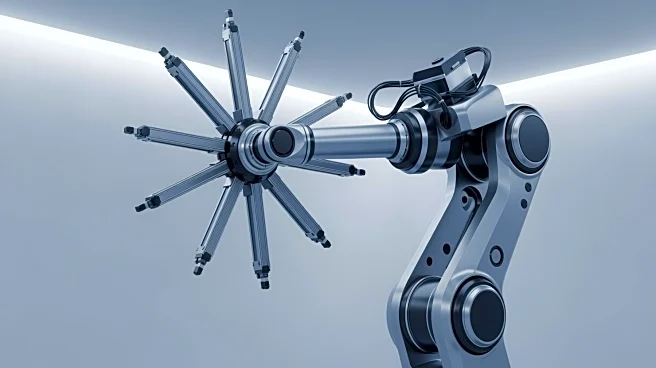What's Happening?
Yamaha Motor has introduced the Yamaha Motor Cobot, a seven-axis collaborative robot designed to work safely alongside humans. This marks Yamaha's first commercially available collaborative robot, featuring a seven-axis configuration that mimics the flexibility
of a human arm. The robot includes integrated torque sensors for smooth motion and can detect and stop upon contact with workers. It operates in two speed modes: a reduced-speed mode for proximity to humans and a high-speed mode for isolated areas. The cobot has a reach of 1,300 mm and a payload capacity of 10 kg, with a maximum speed of 3,000 mm/s. Yamaha has also developed a dedicated controller for the cobot, which operates on a 48V DC power supply, allowing battery sharing with Automated Guided Vehicles and Autonomous Mobile Robots.
Why It's Important?
The introduction of Yamaha's collaborative robot represents a significant advancement in industrial automation, potentially enhancing productivity and safety in manufacturing environments. By enabling robots to work closely with human operators, Yamaha is addressing the growing demand for flexible and safe automation solutions. This development could lead to increased efficiency in production lines, particularly in industries where space constraints and human-robot interaction are critical. The cobot's ability to share power sources with other automated systems further integrates it into existing workflows, potentially reducing operational costs and increasing versatility.
What's Next?
Yamaha plans to continue evaluating the cobot's performance at its Fukuroi South Factory, where it has already been tested under real production conditions. The company is on track to receive functional safety certification from TÜV SÜD, which could further validate the cobot's safety features and expand its market reach. As industries increasingly adopt collaborative robots, Yamaha's innovation may prompt other manufacturers to develop similar technologies, potentially leading to broader adoption of cobots in various sectors.
Beyond the Headlines
The design of the Yamaha Motor Cobot, with its friendly appearance and non-gloss finish, reflects a shift towards making industrial robots more approachable and less intimidating to human workers. This aesthetic consideration may influence future designs in the robotics industry, promoting a more harmonious integration of robots into human-centric environments.















